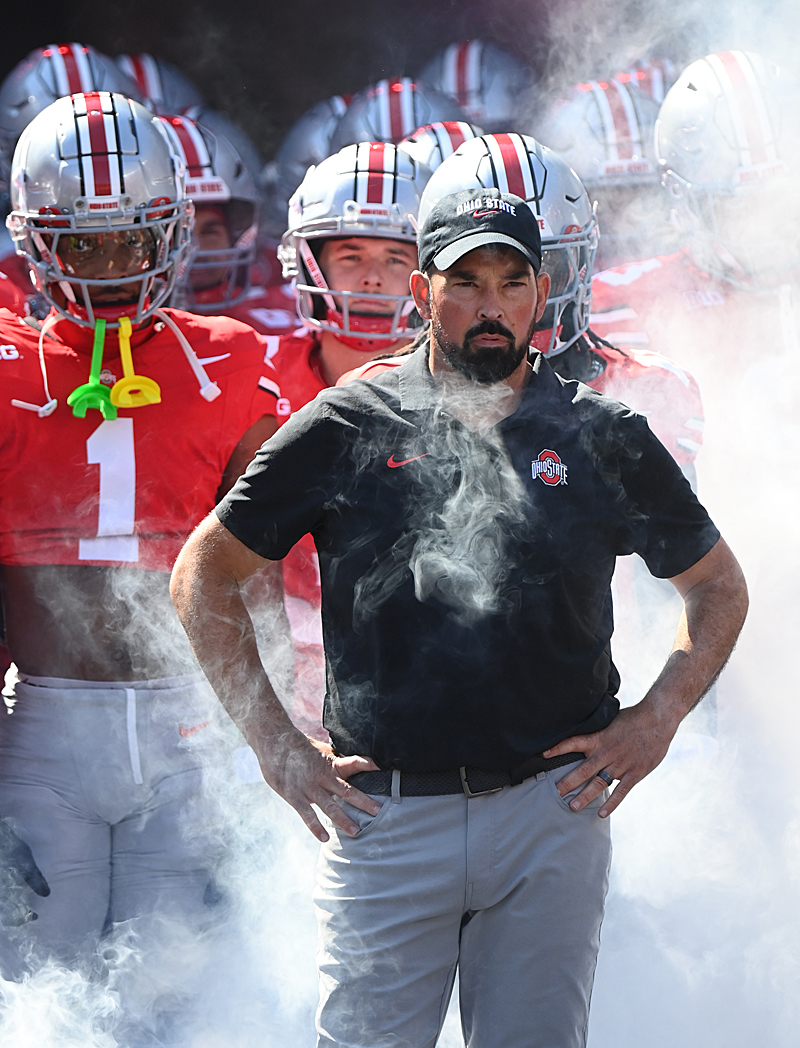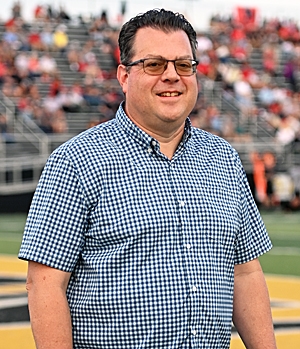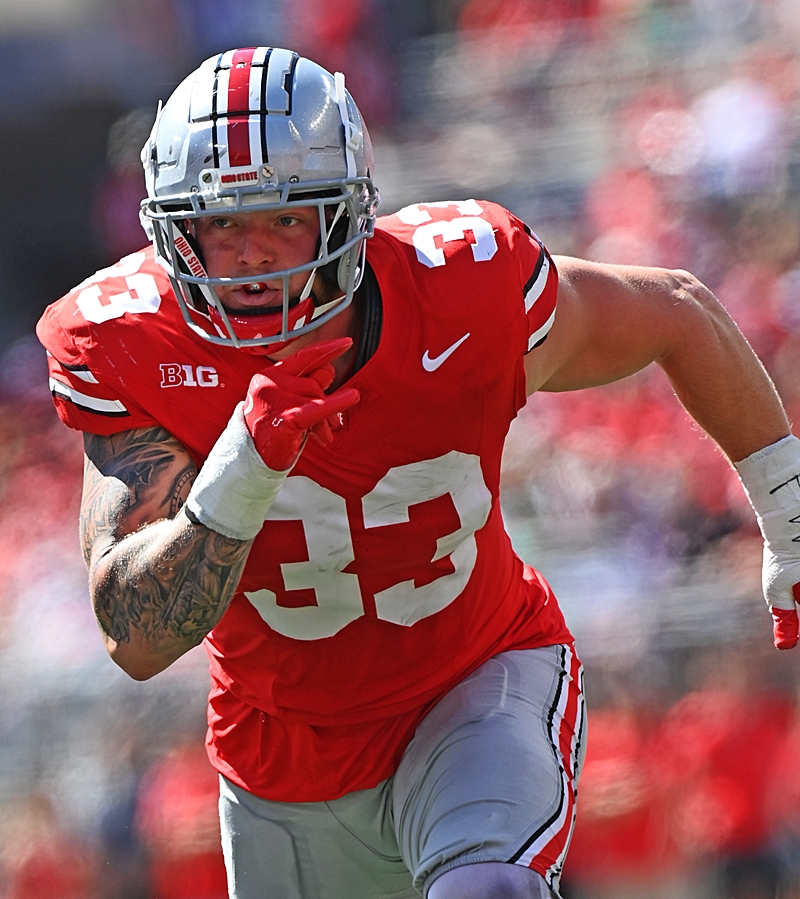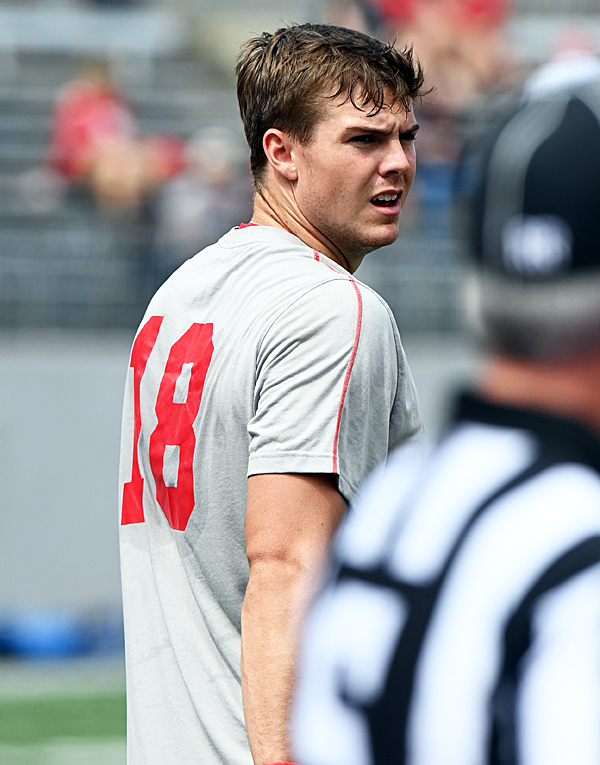
Steaming…Ryan Day admitted, “I’m not happy with anything right now” in Tuesday’s press conference. (Press Pros Feature Photos)
Ryan Day didn’t delve into specifics Tuesday, but there’s no standing pat on pass-rush and fourth-quarter strategies after Oregon exposed weaknesses in both areas.
 Columbus, OH – Back in September when the outcomes of Ohio State football games were known in advance, head coach Ryan Day declared an off week to be Improvement Week.
Columbus, OH – Back in September when the outcomes of Ohio State football games were known in advance, head coach Ryan Day declared an off week to be Improvement Week.
Last week and this week could go by multiple, less positive names.
Let’s start with the defense – specifically the lack of a disruptive pass rush – as the Buckeyes attempt to move on from a one-point loss at Oregon to the second half of the regular season where Penn State, Indiana (yes, Indiana) and even Michigan await. Everything Day said Tuesday screams that these two weeks could be dubbed Overhaul Fortnight.

Veteran columnist Jeff Gilbert writes Ohio State football and OHSAA sports for Press Pros Magazine.com.
The Buckeyes didn’t sack Oregon’s Dillon Gabriel. They didn’t get close enough to touch him. Everyone with a clue about football sees the problem. When asked if he was happy about anything with the pass rush, Day didn’t blink.
“I’m not happy with anything right now,” he said in his first public appearance since minutes after the Oregon defeat. “Certainly, we want to get more pressure on the quarterback. It’s the coaches’ job to make sure that we put our players in a situation and environment to be successful. So that’s the first thing we gotta look at. Then it’s the players’ job to go out and execute it. Those things were part of the conversation this week.”
Day should know what’s being said and planned. Now that Chip Kelly runs the offense, Day has been in defensive meetings more than usual in his new CEO role over all football operations. And when you lose a game at Ohio State, it’s time for the head coach to do some micro-managing.
Day, and presumably the entire coaching staff, believes the right players are in the right spots. That leaves schemes, play designs and game-plan strategies. Oh, and coaching.
“It comes down to scheme,” Day said. “There’s some things that we can do better for sure, putting guys in better situations to be successful. And then there’s the coaching – we definitely could do a better job there making sure that the guys understand exactly what they’re doing.”

Logan Services, in Dayton, Cincinnati, an Columbus, is a proud sponsor of area sports on Press Pros.
The coaches responsible for the pass rush at noon Saturday against Nebraska and beyond are coordinator Jim Knowles and line coach Larry Johnson. The Buckeyes’ have thrived with a four-man front in the past under Johnson’s direction. But that strategy failed against Oregon.
The rushmen package, in which ends replace tackles in the middle, hasn’t worked for a while. Could Tyleik Williams and Ty Hamilton stay in the game in some passing situations, create more push to make the quarterback retreat deeper into the pocket and create better angles for the ends and blitzers to get to the quarterback?
Maybe that’s being discussed.
And what about more blitzers?

Time to disrupt…the pass rush was non-existent against Oregon, and nonexistent against past quality opponents.
Outside of safety Caleb Downs making plays at or behind the line of scrimmage, the defense doesn’t often play the inspired aggressor. There are times to read and react, but there are also times to disrupt. This defense, against the past several quality opponents, is rarely disruptive.
Day didn’t discuss specifics, but it’s safe to assume the effective methods of the past will be more than tweaked going forward. They must. The Buckeyes expect to win out and face Oregon again in the Big Ten championship game. They’ve got 60 minutes of game film to learn from.
“I go in the meetings, and I have hard conversations with everybody, and I know what the plan is going forward,” Day said. “I’m involved with that plan, so I’ve got confidence in all those guys on that side of the ball. I know what we need to get done, and we’re gonna get it done.”
Day was asked about the accuracy of former Alabama coach Nick Saban’s statement this week that Ohio State’s defense looks antiquated.
“Well, when it doesn’t work, it’s accurate,” he said. “It’s not working.”
On offense, a major theme the past two weeks has been the fourth quarter. At Oregon against an inspired team and a passionate crowd, the Buckeyes failed again to finish like a champion. It wasn’t just the final, failed drive and the clock management, it was that they scored only three points.
Fast starts have been emphasized. But games like Oregon aren’t won in the first half. They are won in the fourth quarter. Don’t inflate the importance of halftime scores. Those only matter in blowouts.
“We’ve got to figure out – and I think we have a really good plan for it – how to play better in that fourth quarter and win those games,” Day said. “That’s been a huge part of the conversation the past week.”
Maybe all the answers to winning a national championship are in schemes and execution. But maybe there’s more. Maybe this is also a time to recommit.
Quarterback Will Howard said after the Oregon loss that he hoped the result would light a fire under the team. Day said twice Tuesday he wasn’t happy. So does this time between games need to be a time of refocusing and getting serious?
“I don’t think Will meant it like that,” Day said. “He probably just meant it like we all do. You put patches and Band-Aids on things, then you go to a loss and it gets ripped open. You have harder conversations, you make bigger decisions and you drive it harder.
“It’s not anything like we haven’t been going hard or pushing hard. We’ve been going a hundred miles and hour around here. So I don’t think that’s the case.”

“We talked about we wanted to flush that game, but we’re not going to forget about it. We want to use it.” – quarterback Will Howard
While Day may have seen urgency in his team from the start, Howard, as a leader among his teammates, is looking for more. The methodical buildup to the Oregon game might not have prepared them as well as they thought.
“We talked about we wanted to flush that game, but we’re not going to forget about it,” Howard said. “It’s going to be in the back of our head. We’re going to use it.
“I’m almost glad it happened now and not at the end of the season to where some of those issues may have gotten swept under the rug if we win that game. I want to be able to look back and say this is the reason that we went on a run and won the national championship.”
The beauty of the 12-team playoff is that all of the Buckeyes’ goals remain attainable. Another loss might not eliminate them, but they don’t want to find out.
“If nothing else, it gives us a little more extra motivation because now we know what it feels like to lose a game,” Howard said. “I can guarantee you none of us want to feel that again.”
Two weeks ought to be enough time to make sure that feeling doesn’t make an encore.



